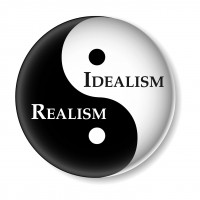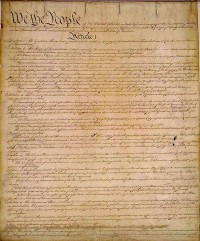Idealism and Realism, the Yin and Yang of Society
Idealism vs. Realism
My mother used to have a saying posted on the bulletin board in her kitchen. It went something like the following, “If you are not an idealist at age 20 you are not normal. If you are not a realist by age 30 you are not normal.” It reflects a pattern of thought where youth is out to conquer and remake the world as a better place, followed by the realism that sets in when we encounter the necessity of hard work and living with others that do not share our ideals.
Idealists want justice, fairness, prosperity, peace, and happiness for everyone. Idealists want to change the way the world works so that everyone has an ideal life.
Then, under normal circumstances, idealists become realists. They find out that money doesn’t grow on trees, that not all people feel their ideals can be accomplished in the same way, and that many people will exploit others if they can. This may mean an industry trying to exploit workers for the sake of owners and directors, or it may mean interest groups trying to manipulate the government to take someone else’s property for a group that wants more than it has. This includes the former idealist, that decides, based on realism, that he needs to manipulate the government to obtain his ideal by redistributing the taxes of others for himself or his group.
Idealists often oppose realists, perhaps out of naivete. Realists often oppose idealists, perhaps out of selfishness or the desire to survive.
Imperial China
However, a society cannot function on idealism or realism alone, it needs both working together harmoniously, like yin and yang in the ancient Chinese philosophy of Taoism. In fact, when Imperial China in the Middle Ages was stable and flourished from 7th century to the 14th century c.e. (the Tang-Song Dynasties), there was a conscious reflection on this principle, where the Yin represented the social and moral order and ideals of Confucianism that individual people were expected to follow, and the Yang represented swift and certain justice dealt to people who transgressed the laws.
Of course, for the system to work, the laws had to reflect and support the moral and social ideals of Confucianism and could not allow corruption, impropriety, or injustice—for example when tax burdens became to heavy for people to bear. In addition, for the system to work the technological infrastructure, which included the maintenance of waterways and the irrigation system for the production of an ample food supply, had to be maintained by government leaders competent in their administration. Hence, a civil service system based on merit and ability, rather than kinship, bribery, or popularity, was an essential ingredient in the longevity of Imperial China in the Middle Ages.
The breakdown of the Chinese system eventually occurred from a failure to adapt its ideals of Confucianism to advances in technology and the rise of foreign powers, particularly Britain, that sought to trade with or colonize China. Reliance on a rigid orthodoxy developed by a much older society proved wholly inadequate to modern challenges of globalization and after a centuries long decline, the empire collapsed in 1911.
The Idealism and Realism of the American Experiment
The American Experiment, born in the modern world, was grounded in a philosophy that recognized an essential relationship between moral ideals and realism. The ideals were declared in the Declaration of Independence under the banner of the right to life, liberty, and the pursuit of happiness. The founders’ realism was enshrined in the Constitution that was designed to protect people from concentrations of power and the abuse of government power.
While the American founders all believed in the importance of the moral ideals enshrined in the Ten Commandments and the Sermon on the Mount, many were enlightened naturalists that viewed religion functionally rater than doctrinally. They held that the role of religion in cultivating values was essential for the cohesion of society, but that which religion one joined was not essential. For example, Benjamin Franklin contributed to the Episcopalian Church, the building of a Synagogue, and to George Whitfield’s revivals. He told his daughter she could chose whichever religion she preferred, but she should go to church every Sunday. In theory, this “more perfect government” would not produce an ossified orthodoxy because its concept of separation of church and state would allow competition among religions to produce and inculcate the values necessary for social cohesion.
Hence, religion would provide the idealism of American society, and a constitutional government that enforced laws that reflected the transcendent values towards which all religions strive would provide the realism society needed to prosper. In his book The Lively Experiment, historian Sidney E. Mead called this the “heart” and the “head” of the American Revolution.
Centralization of Power and Culture Wars
Despite flawed beginnings, like the acceptance of slavery in the South (laws that did not reflect the ideals), the United States experienced unprecedented growth and prosperity when and where the values prevailed and limited constitutional government existed. The land frontier that afforded an agrarian society ample land for self-sufficient families was a blessing that cannot be underestimated, for it provided the economic equivalent of China’s technologically developed waterways that sustained a food supply that nourished all its citizens.
However, from the very beginning of the experiment people sought to maximize their positions by using the powers of government for selfish purposes. They sought to undo constitutional safeguards in pursuit of their own interests. Those watching the government were often elected by popularity, not skill. And as the nation grew, those in government as well as those electing and appointing them, placed self-interest and political gain ahead of actual qualifications.
Congress passed laws that went against the intent of the Constitution. The Supreme Court, itself swayed by social fads and industrial power, did not object. By itself, the Constitution could not guarantee the future, for it required a people capable of maintaining the principles and ideals it enshrined. If you want a good history of exactly how this decline occurred, please read my book, Life, Liberty, and the Pursuit of Happiness, Version 4.0.
Religion in the private cultural sphere failed to adequately perform its function. Rather than competing to inculcate the more universal ideals and skills required by citizens of a democracy, some religions preyed upon ignorance, fostering churches of narrow religious exclusivism. Some people who espoused a more tolerant attitude, seeing all religions as performing the necessary role of raising good citizens,were often treated as heretics by religious zealots who would urge they publicly stand up and recant. There was a notorious persecution of the Freemasons (50 of the 55 signers of the Constituent were Freemasons) during the first two decades of the 19th century. Two governors were elected on the “Anti-Mason Party” ticket. Then came a new wave of revivals, quite different from the unifying first wave led by Johnathan Edwards and George Whitfield. This wave created a new form of American Christianity that became called “Christocentric Liberalism.” It had the hallmark of emphasizing a personal relationship to Jesus, and in many cases abandoned talk about God or the Creation. Catholics and non-Christians were often ridiculed in public schools. This wave of Christianity served to divide Americans and break down the common identity they had achieved during the revolution.
The irrationality of many fundamentalist Christian doctrines caused a secular backlash that led to amoral values, or moral relativism incapable providing the ideals society needed to sustain itself. By the 1960s, the triumph of such views as mainstream led to the eventual acceptance of the use of political power to enforce values rather than religious power to inculcate character traits in individuals that would nourish a society of freedom. The result was a gradual loss of freedom and increase of totalitarian society. For a greater understanding about how the demise of the American ideals occurred, please read my book, Philosophy of the United States: Life, Liberty, and the Pursuit of Happiness.
Return to a balance of Idealism and Realism
If the United States is to end its decline in liberty, prosperity, power, and prestige, it must recapture the basic ideals and constitutional realism that made it great in the first place. Otherwise, we can expect further erosion of the economy and squabbles over political power until it experiences bankruptcy or citizen’s rebellions. It is not too late to return to these conditions without a revolution, but it requires a reeducated citizenry and skills to reprogram the government, one law at a time, to arrive at a state that I have termed “Life, Liberty, and the Pursuit of Happiness, Version 4.0”





I am much more sceptical about idealism. I think a person’s ideals are a projection of some part of themselves which they kind of worship – Durkheim’s argument about totem poles and religion being society worshipping itself. Idealists tend to think their ideals are absolute and should be the way the world is. Again rather self-centred expecting the world to change to fit one’s idea of how the world should be. And then they often try to impose these ideals on the world if they get a chance (like the Bolsheviks did in Russia and the neo-conservatives did in Iraq) and re-educate or kill those who don’t want to conform to their ideals. A realist, following Aristotle, would recognise that there are a variety of political structures that work and allow people to flourish. What is important is that they are legitimate to the people who live in them. If they don’t like them it is only they who have the responsibility and authority to change things. So I think your mother was right – idealism, like infatuation, is something one should grow out of.
William, I think I agree with most of what you say about the pitfalls of idealism and its youthful expressions without realism. I was trying to relate “social idealism” more to a set of cultural norms that enable people to function and interact with one another autonomously, and provide the tools of self-governance. In this regard the Confucian system of social order, or the Ten Commandments combined with the Sermon on the Mount, provide the basis of “Yin” in the Chinese and Western culture spheres. However, it is realistic to assume that no society will contain people that are all self-governing and never harm others. Therefore the “Yang” of legally enforced order is necessary. I totally agree that the “Yang” has to be viewed by the people as legitimate.
You make some good points. Without principles and ideals we loose our common humanity and get lost in individuality. In the end we are all looking for the same thing: fulfillment, love and to be loved, and purpose. Unfortunately, we can only find that fulfillment in a country of freedom, under protection of laws that guarantee freedom and free choices. Too much government restricts those free choices. Until now, the U.S. was that country providing that freedom. I hope and pray that the new realism is not suffocating our idealism.
The idea of interdependence of idealism and realism (yin and yang) in society has a flavorful and naturalist appeal. As a person familiar with
Confucian ethics and American history, your topic whet my appetite. A moral idealism must be coupled with a pragmatism or practiced reality. As it seems the coupling of idealism and realism was the goal of the Confucian meritocracy and framers of the American Constitution. To begin with, I would actually agree that the American Founding Fathers and Confucian public servants viewed religion functionally rather than doctrinally. There is reason to think they shared a type of enlightenment that the inculcation of moral ideals was essential to the cohesion and prosperity of society. However, the Imperial Chinese view of the role of religion was vastly different from the views of Medieval Christian theology. The Founding Fathers were well aware of the abuses of state established Christianity and the bloody conflict between Roman Catholicism and Protestantism. Thus the State would be separated from the establishment of religion. On the other hand, the Confucian ideal of the Mandates of Heaven were to be integral to the functioning of the legitimate State. Confucian family ethics, loyalty and friendship were prerequisite to being appointed to pubic office. Over the course of history this proved to be an elusive ideal. The Chinese were not immune to factional infighting, in the West which would be called Machiavellian. Yet this would not lead to the extinction of Imperial China. The fall of the Chinese dynasty would come at the hands of Western power, modernity and sorcery. The Chinese bureaucracy had no answer to Western militancy. The ideals of a Confucian meritocracy fell to the wayside due to the forces of industry, exploitation and political expediency. The decline in the prestige, prosperity and liberty of the United States has similarities to the decline and fall of Imperial China. Religion in America has faltered in its role to inculcate the moral ideals of respect for public leadership, family cohesion, and professional integrity. Rather, it has fallen into moral relativism and doctrinal irrationalism. To stop this decline America must experience a revival of a moral ethic that transcends narrow factionalism or greed that drives political competition and commercial exploitation. It is calls for a serious reflection on the “moral ideals that individuals are expected to follow and the certain justice dealt to people who transgress the law”. It is the return to interdependence of idealism, pragmatism and realism ( Tao ).
Robert makes very excellent points. The US had a “general religion” of the founders that has dissipated and turned into factionalism and moral relativism. If the common values prevalent at the American founding were tempered by Constitutional checks and balances that Imperial China could have benefited from, as the Confucian ethical system had to be balanced by checks on abuse of power that is often called “oriental despotism.” But the Confucian ethical system basically went unchallenged as a system of morality and remained the “social glue” for centuries. Unfortunately the doctrine of the separation of church and state in the USA led to a situation where, in the absence of an official religion, Christianity’s doctrines were insufficiently powerful enough to provide that type of social glue over a long period of time. I think you also need limits set on moral deviation that stem from practical experience and social scientific data. Moral anarchy is no more possible than political anarchy.
I like your thinking on yin and yang: Here is a response I recently made to a short lived article on Newsweek where a journalist had done a story decrying the refusal of New Orleans charter schools to admit a student with learning (and potential behavior)disabilities:
And what’s the big deal if the charter schools won’t let everybody in? Let’s just continue to live in la-la land in this country. Sure we can continue to afford to have our little Utopia here in the U.S.A.
Wake up to the real world, You have to match perfect idealism with perfect pragmatism if you want a true utopia. So far, all we understand is that we think we can indulge everyone’s expensive desires. Our schools spend unbelievable amounts of money to babysit our children while claiming it is education.
We pursue perfect idealism to our detriment. Want to give everybody that can’t afford a lawyer a great one? Fine. At the same time you better make sure that your police have cameras on every street in every house or else all you are doing is letting the system get out of balance. A perfect system gives everyone a perfect defense while giving the prosecution the PERFECT OFFENSE. But you must have BOTH in a truly ideal system.
How about throwing money at every poor family without making any effort to make sure that those who don’t seem to be able to afford to have or simply don’t need to have children stop having them?
You think we can continue to indulge yin without giving any thought to yang?
If New Orleans school system is actually performing well, it is likely because a lot of the crap that says that EVERY single child is going to get EXACTLY the same education and reach EXACTLY the same level of competence is NOT APPLYING to New Orleans new system.
Go ahead, MAKE our nation’s school continue to dump our tax dollars in the trash with total disregard to the advisability of the way we spend the nation’s money.
Continue to pursue your completely twisted idea of a Utopia by wanting things that a sustainable economy could not possibly sustain.
I have been struggling with the idea of realism vs idealism for a very long time and I have to say: your article has been quite insightful.
Check out my ‘young’ ideas on this topic at idzawordsmith.wordpress.com.
Thank-you.
Pingback:Introduction | A letter to all idealists